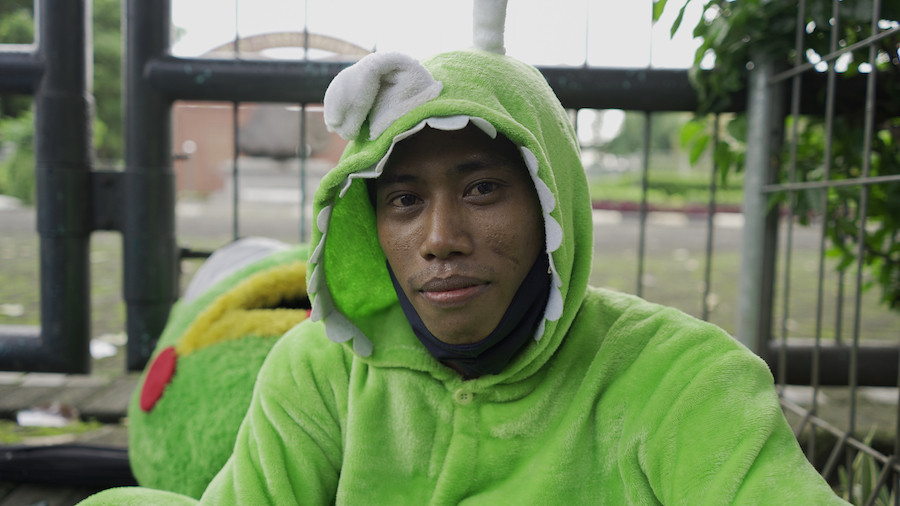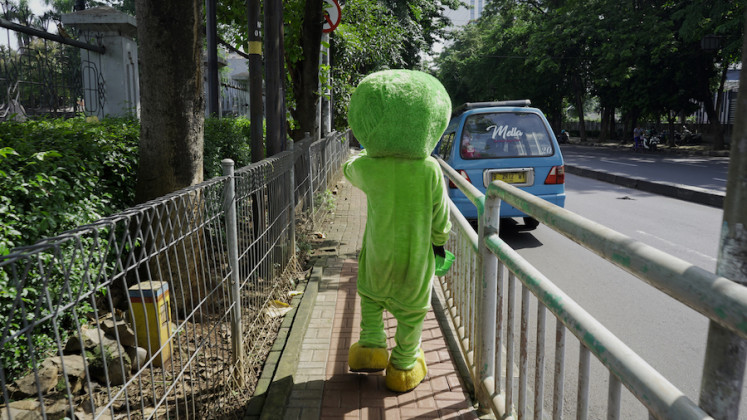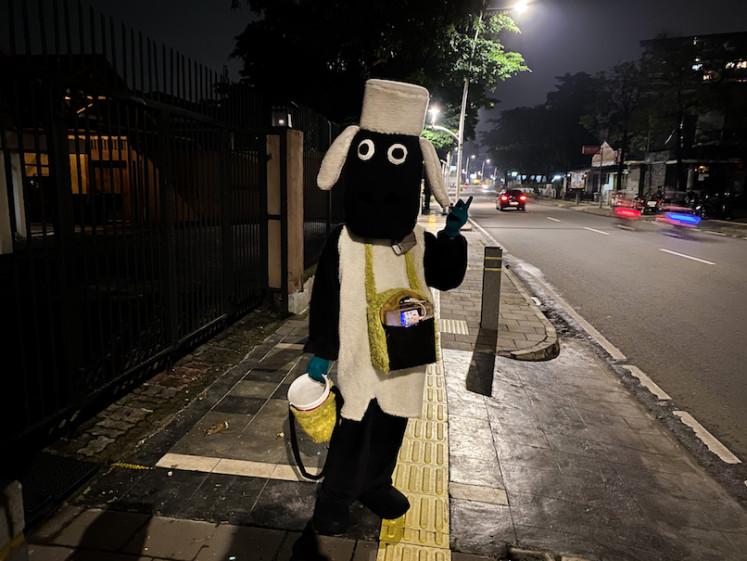Popular Reads
Top Results
Can't find what you're looking for?
View all search resultsPopular Reads
Top Results
Can't find what you're looking for?
View all search resultsJakarta's 'sad clowns': Resilience and fortitude during COVID-19
As the economy declines and the job market plummets amid COVID-19, some young Indonesians have turned to performing as badut jalanan in the painful heat to survive.
Change text size
Gift Premium Articles
to Anyone
I
n some ways, Daryanto resembles DC Comics’ the Joker, albeit without the violence. His life may seem a tragedy, but for him, it's a comedy. At least, that’s how it came across in the way he smiled while speaking with me.
I met the 25-year-old on the first Sunday of this February at a busy intersection in Cilandak, South Jakarta. It was 3 p.m. and the rainy season, but the sun still shone relentlessly. He was standing on the roadside under a traffic light, in a frog costume with a bobbling head, like a life-size localized Kermit the Frog. Clasped in his right hand was a small green basket.
The bright green costume made him stand out amid the monochrome sea of vehicles that passed the street before him.
When the light turned red, he started performing, waving to motorcyclists, dancing and making silly gestures. All eyes were on him, as if the sun was his spotlight and the street his stage. After a few seconds, he started his rounds, going from driver to driver, holding out his green basket in a conscientiously polite manner.
Some put money in his basket, but most didn't.
When the light turned green, he stepped back and sat on the sidewalk to wait for the next round. A physically excruciating job, he does this every day from 10 a.m. to 5 p.m. to survive.
I approached him during a break in his routine, asking if I could interview him and take a few photos. He agreed, and we walked to a quieter corner of the endlessly busy, loud street. His yellow-furred shoes were heavy, and I had to wait for him to catch up.
"I've done this for almost two months now," said Daryanto, who lives in Ciganjur, South Jakarta.
Before this, he was an angkot (minibus) driver serving the Ciganjur-Pasar Minggu route in South Jakarta, a job he’d had since he was in junior high school. He told me the job was dear to him and he was content. But the pandemic forced him to quit, simply because fewer and fewer passengers hopped on his angkot, most likely due to the COVID-19 restrictions.
Before the pandemic, Daryanto could take home around Rp 200,000 in wages after his angkot boss took a cut. But he had barely scraped by over the past year, averaging only Rp 30,000 each day.
Desperate for a decent income, he finally took up a friend’s offer to work as badut jalanan (street clown), a blanket term for any costumed street performer. He rented a costume from his friend for Rp 40,000 a day. On good days, he would make Rp 150,000, enough to support his parents and sister.
"It's the only job available to me right now, so I can't complain," he said while taking off his costume, the black T-shirt he wore beneath soaked through with sweat.
I could only imagine how hot it was under that costume, made from polyester velboa, a type of faux fur fabric. The only air circulating through the frog costume came through its mouth.
Daryanto told me how 2020 had been extremely tough. That horrible year, his 2-month-old daughter died in her sleep from SIDS (sudden infant death syndrome). His marriage crumbled soon after and his wife left him. Still, he refused to let his bleak reality drag him down.
Watching him perform, it seemed as if his burdens disappeared.
"Some people I've met would pity me," Daryanto said. "But I never ask for that. For me, it's all about survival. It's better than [turning to] crime."
As the Indonesian economy dwindles to an all-time low and millions lose their jobs or livelihoods, these badut sedih, or "sad clown" as many Jakartans call them, can be seen roaming every busy intersection, in the road and on the curb. With few jobs available, the health crisis has forced many jobless to don a costume and head to the streets just to get by.
Some clowns chose to perform at night to dodge the authorities (JP/Adi Renaldi)Rahman Abdul Wahid has a similar story.
An elementary school dropout, the 20-year-old from Lenteng Agung, South Jakarta, doesn’t have many opportunities to land a decent job. Wanting to support his family of five, he joined a friend as badut jalanan, buying one costume for the two of them to share. The duo takes turns performing at an intersection near Ragunan Zoo, on the southernmost end of South Jakarta where the capital borders Depok, West Java.
"If I get tired, my friend will put on the costume, and we split the money we collect," said Rahman.
Busking, hawking and begging on the streets are illegal and punishable in some provinces, including Jakarta. Violators can face up to 20 days in jail and a fine of Rp 20 million. But that doesn't stop people like Daryanto and Rahman from donning their costumes and trying to make a living.
Always sweaty and tired, Rahman said the job was never easy. He often played cat and mouse with authorities, who say street performers are a "public nuisance".
"Officers from the Social Affairs Ministry and Satpol PP (Public Order Agency) would stop by and tell us to leave. We pretend to leave but [just] hide, and go back to performing a few minutes later," Rahman told me.
If playing cat and mouse with the authorities is counterproductive, “Gondrong” has a better idea. The 30-year-old is a parking attendant by day and a badut jalanan by night. Preferring to use only his nickname, which means long-haired in Indonesian, Gondrong wears a costume fashioned after Shaun the Sheep.
I met him at around 10 p.m. on Jl. Kemang Raya in South Jakarta. He had slung a stereo around his neck that played popular children's songs. The audio quality was wanting, with audible buzzing and hissing that made it painful to listen to and almost impossible to identify the tune being played.
I glanced down at the small basket in his right hand, which held only a few coins.
When the government imposed the large-scale social restrictions (PSBB) last year, the parking area where he usually operates became almost deserted. Gondrong has been a badung jalanan since last November, hoping to scrape together some extra cash for his family. He plies the streets of upscale Kemang only at night.
"The government sleeps at night. I don't worry about being kicked out by Satpol PP if I busk at night,” he said. “Plus, it's not that hot compared to busking midday."
The government rolled out cash and food assistance for 1 million Jakartans in April 2020, the month after the first COVID-19 cases were detected in the country, and increased the social assistance budget last month. However, the corruption scandal surrounding the distribution of COVID-19 relief aid that implicated Social Affairs Minister Juliari Batubara and several politicians left many Indonesians disenfranchised and discontented, with still no opportunities for decent jobs.
Read also: Jokowi orders Risma to speed up aid disbursement
The badut jalanan I interviewed were well aware they couldn't rely on government assistance, simply because it was inconstant and not enough to cover their monthly needs.
It's about going hungry or die trying, they said. They all chose the latter.
This is part 1 of a two-part story. Part 2 will be published on Feb. 11.












